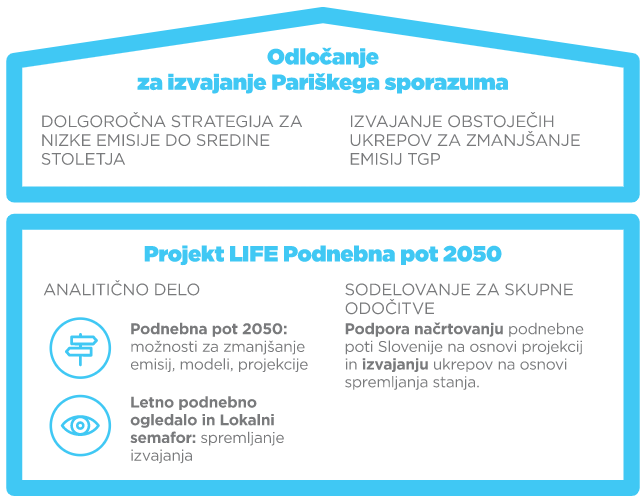

Projekt LIFE Podnebna pot 2050 je namenjen spremljanju napredka in načrtovanju podnebnih ukrepov za zmanjšanje emisij toplogrednih plinov na področjih stavb, prometa, industrije, kmetijstva, gozdarstva in odpadkov. Projekt gradi na razvoju in dopolnitvi obstoječega sistema za pripravo projekcij in spremljanju situs toto izvajanja ukrepov.
Izdelali smo orodje Preglednik za lokalne skupnosti s potenciali in projekcijami zmanjšanja emisij v stavbah in vozilih, prikazanimi po občinah.
Več o temModeli in metode, ki smo jih v projektu razvili in nadgradili, so trden metodološki okvir za analize scenarijev energetske in podnebne politike ter tudi za politike na področju zmanjševanja emisij onesnaževal zraka. Za vrednotenje in primerjavo možnih podnebnih poti uporabljamo sklop povezanih modelov.
Več o temZa lokalne skupnosti smo pripravili posebno poročilo s povzetkom analize potencialov.
Več o temAnalize potencialov so temelj za oblikovanje ukrepov in ciljev na podnebni poti. So izhodišče analize scenarijev za prehod v podnebno nevtralno družbo.
Več o temV torek, 10. oktobra 2023, sta v veliki sejni sobi Ministrstva za okolje, podnebje in energijo potekali še dve delavnici iz sklopa delavnic Kazalci Podnebno ogledalo, in sicer za področji stavb in p…
Več o temV torek, 3. oktobra 2023, sta v veliki sejni sobi Ministrstva za okolje, podnebje in energijo potekali prvi dve delavnici iz sklopa delavnic Kazalci Podnebno ogledalo, in sicer za področji zelena gos…
Več o temVabimo vas, da se nam pridružite na štirih delavnicah, v okviru katerih bomo 3. oz. 10. oktobra 2023 predstavili stanje in trende ter uporabo kazalcev na štirih področjih (zelena gospodarska rast,…
Več o temPospešitev izvajanja ukrepov, usklajeno podnebno upravljanje in dostop do energetske učinkovitosti za vse prebivalce so za doseganje energetsko podnebnih ciljev in ekonomsko vzdržen zeleni prehod k…
Več o temV torek, 17. maja 2022, je v veliki predavalnici Instituta »Jožef Stefan« potekala pripravljalna delavnica za Podnebno ogledalo 2022. V njenem okviru so bile predstavljene aktualne informacije o do…
Več o temPodnebno ogledalo, dokument, v katerem so predstavljene glavne ugotovitve spremljanja izvajanja ukrepov za zmanjšanje emisij toplogrednih plinov (TGP) za preteklo leto, pripravljamo letos že peto le…
Več o temNa Centru za energetsko učinkovitost Instituta »Jožef Stefan« v sodelovanju s PNZ, Kmetijskim inštitutom Slovenije in Gozdarskim inštitutom Slovenije letos pripravljamo že peto Podnebno ogledal…
Več o temV petek 10. 12. 2021 med 9. in 11. uro je potekal spletni strokovni posvet z razpravo o izzivih in strateških usmeritvah sektorja ogrevanja in hlajenja v Sloveniji.…
Več o tem